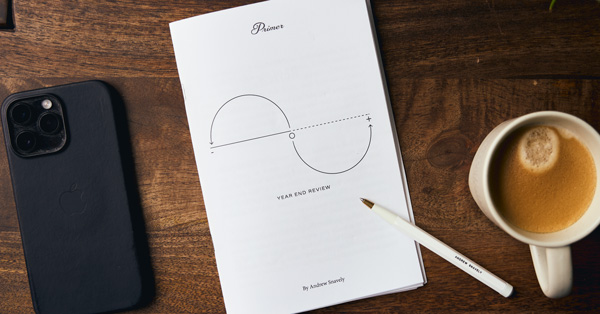I like to hang out at around 202 pounds, but when I hopped on the scale at the end of May after 10 weeks of lockdown I got a nasty shock…
214.
What? Where did that come from? I knew I’d been having a few more sweet treats lately, but 12 pounds??
I’m 6’7” so 214 may not sound like a lot, especially if you consider LeBron is 250 at 6’9”.
Here’s the thing: LeBron has two inches on me and is literally made of kettlebells. I’m crushing it if I work out three times a week for 30 minutes.
Is It Time To Consider Your Weight?
For some, it’s about how they look in a swimsuit. For others, it’s about trying to be healthier. Whatever your motivation, your target/goal/ideal weight is highly individual.
How do I know my “best” weight? As a teenager, my doctor once told me being a tall guy is hard on the joints (gravity, etc.). He was right. Once I get north of 210 I start to really feel it in my knees.
It’s unscientific but hey – it’s how I know.
Bottom line: I’ve learned over the years that significant weight gain means I’m probably not living as well as I’d like.
Why It’s So Damn Easy To Gain Weight Right Now
I was on lockdown and stressed out about COVID, the economy, and keeping my family safe. So I started self-medicating with my drug of choice: sweets.
The messed up thing is, I was only vaguely aware I was doing it.
Research has revealed that when we’re stressed the more developed part of our brains that’s responsible for long-term decisions – the neocortex – stops functioning like it should.
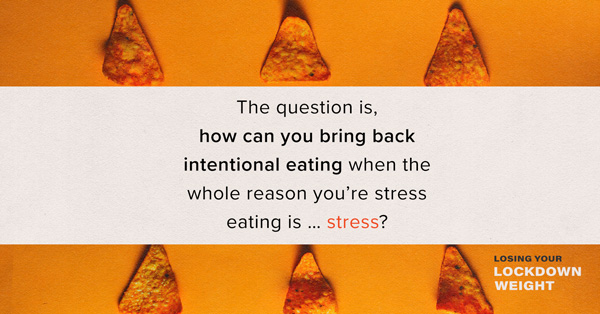
Instead, we start making decisions with our limbic system – a part of the brain that acts like a resource-hoarding gremlin when we feel under threat. In other words, stress makes it hard to be intentional about your food choices because the intentional part of your brain is no longer calling the shots.
Studies have also revealed that high calorie comfort foods juice the brain with dopamine, a hormone and neurotransmitter that helps make us feel happy.
It’s a one-two punch. During times like this it’s harder to eat well and easier to eat badly.
If you consider that all it takes to gain a pound a week is an extra 500 calories a day (that’s one plain bagel and 3 ounces of cream cheese) it’s no surprise so many people are struggling with their food choices.
Here’s how it happens…
A Case Study In Lockdown Stress Eating
My wife and I don’t normally keep sweets in the house. During lockdown, however, we weren’t going out for treats. We were also freaked out about food shortages. So we bought flour, sugar, and baking powder and started making our own.
“Oh, we’ll just make some cookies this week,” we told ourselves.
Do you know what 5 peanut butter cookies a night for 7 nights in a row equals? The extra 3500 calories I needed to gain a pound that week. And it happened week after week.
We’re fortunate. We have access to plentiful food and can afford it, but the gremlin in my brain’s limbic system used my fear to run wild.
If this reminds you of you … don’t despair. You can get back on track. Let’s talk about how.
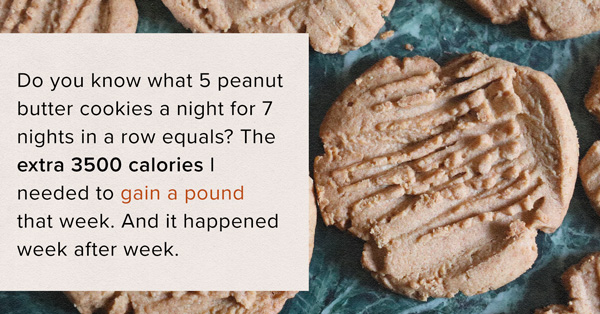
Bring Back Intentional Eating
The longer you eat without intention the more it becomes the new normal instead of a temporary self-indulgence.
The question is, how can you bring back intentional eating when the whole reason you’re stress eating is … stress?
1. Proactive Stress Management
Don’t just treat the symptom (your weight); start with the cause (your brain’s response to what’s going on).
The key to getting back on track is soothing your limbic system so the more developed, wiser parts of your brain can make better decisions.
What does stress management mean for you?
This is different for everyone and I won’t pretend to have all the answers, but I can share what’s been working for me…
2. Manage Your News Intake
I’ve been using the Freedom app to block news sites before 8 AM and after 9 PM. This way, I’m not reflexively checking headlines right when I wake up and immediately before going to bed.
I’ve noticed a positive change in my sleep. I’ve also noticed that I’m not craving a nocturnal sweet treat quite as badly. Is there a connection? I’d say so.
I learned about Freedom from our guide that’s packed with mind hacks for finding more time, staying on task, and beating distraction: 13 Bulletproof Tricks for Finding Time for Your Side Hustle.
3. Shift To Healthy Treats
I’ve cut out treats with added sugar and foods with empty carbs. I was self-medicating, pure and simple. The cookies, pie, donuts, and chips had to go.
This did not mean cutting out sweets entirely. In my experience, cold turkey leads to relapse. As I learned from a licensed dietician, it’s better to swap in healthier foods that still provide a modest hit of dopamine as you ween yourself off sugar dependency.
For a list of junk food to healthy treat swaps, check out our feature: Cut Killer Sugar Without Even Noticing It.
4. Get Physical Again
Before the pandemic, I rode my bike to work at least twice a week. During lunchtime, I’d often get in a quick workout.
Lockdown ended all that.
I don’t need to tell you: exercise zaps stress. Add to that the fact that the evidence shows modifying your diet and exercising more is more effective for weight loss than either approach by itself.
But how do you get back to working out if you can’t hit the gym (or don’t feel comfortable yet)?
5. Get Excited About Something New
It’s easier to start a new thing you’re excited about than force yourself to go back to your same-old.
Ask yourself, “What’s the workout I’ve wanted to try but didn’t have the time (or money)?” With everything from spin class to yoga fully online and much of it donation-based, there’s never been a better time to start moving in a new way.
For me, starting the New York Times Scientific 7-Minute Workout was a fresh challenge and just the thing I needed to re-engage with exercise.
Try our new favorite workout here: Science Determined The Perfect Home Bodyweight Workout & It Only Takes 7 Minutes.
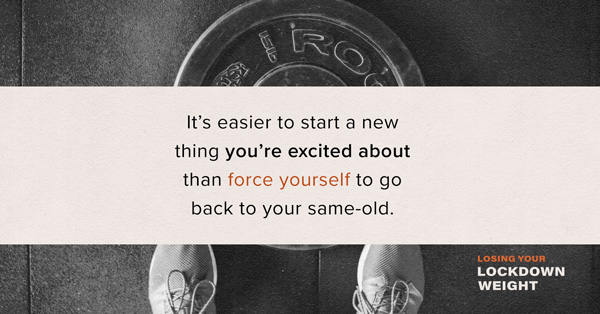
6. Consider Eating (A Bit) Less
There’s this idea in popular culture that THE key to losing weight is working out. Here’s the facts:
Approximately 75% of the calories we burn are used for our Resting Metabolic Rate. Basically, the energy we need to sit calmly and exist. We have no control over this 75%.
That means only a very small percent of the calories we eat every day can be burned through exercise. One hour of hiking or biking will burn about a donut and a quarter. An hour of chopping wood like Paul Bunyon gets you two donuts. You can actually calculate just how few calories you burn with most activities.
To really lose weight, you need to eat less. One way is to eat differently, as we’ve already discussed. Another way: simply eat less.
But eating less can get tricky.
There’s another, equally unhelpful idea in our culture: the secret to weight loss is extreme, life-altering dieting. The reality is that 50% of people who try a diet regain all weight within two years. Only about 5-10% achieve lasting weight loss.
The current guidelines for minimal (and therefore maximally achievable) weight loss call for about 500 fewer calories a day. For me, this has meant trying to load my plate just a little less. Like, a few bites less 2-3 times a day.
I love food and I don’t want to turn food into a source of guilt. That’s why portion control is last on this list.
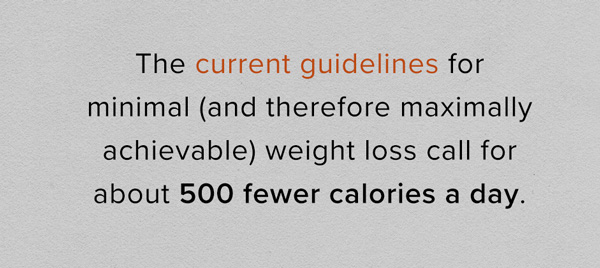
Together, We Can Do It
Losing a pound a week is considered safe, and I’m happy to report that I’ve achieved that for the last four weeks. I haven’t done anything more than what’s described above.
Now, as my sweets intake has dropped to near zero, my evening alcohol intake has ticked up a little bit. My limbic gremlin is still in there, lurking. (If you’re questioning your alcohol use during COVID, check out our Gentlemanly Advice on problem drinking).
For me, this project isn’t just about the number on the scale or the ache in my knees. It’s about trying to tweak all the factors that contribute to that number: stress, moving a little every day, and being intentional about what I eat.
Honestly, it’s not really about the number at all. It’s about getting back to normal … whatever that means right now.
Hopefully, enough of us being intentional about ourselves will help us turn outward, and bring the same spirit to healing our communities. “Put down the cookie and save the world” is downright silly. And yet – everyone has to start somewhere.



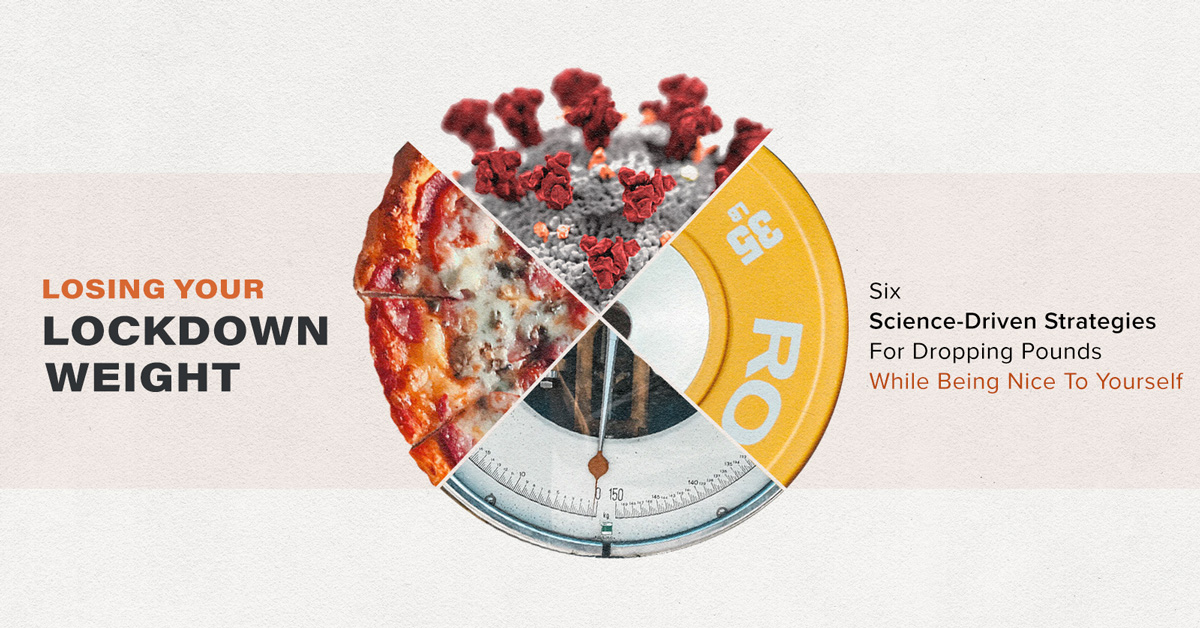




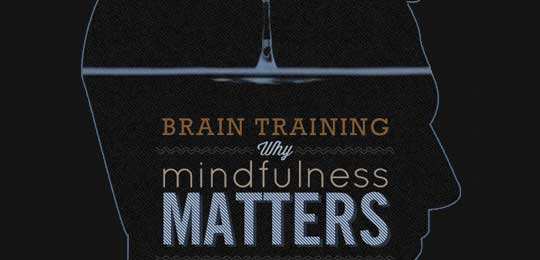

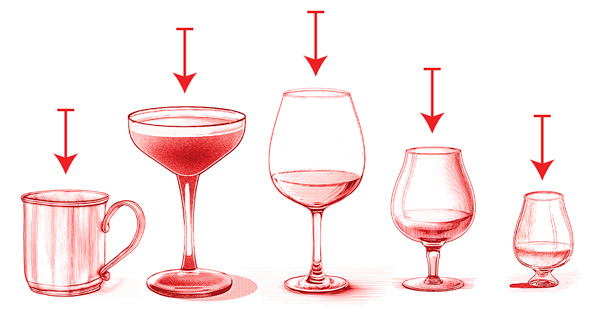

![It’s Time to Begin Again: 3 Uncomfortable Frameworks That Will Make Your New Year More Meaningful [Audio Essay + Article]](https://www.primermagazine.com/wp-content/uploads/2025/01/begin_again_feature.jpg)

